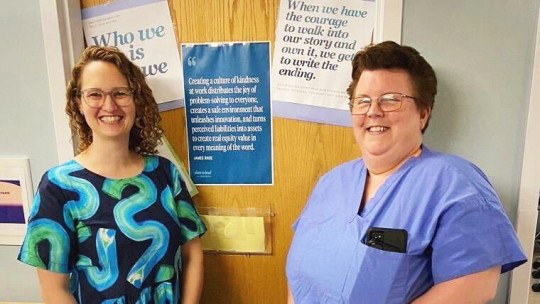(Kelly Light with Maxine Bernard, photo submitted)
Kelly Light is a clinical nurse educator from the Royal Children’s Hospital of Melbourne, Australia. She recently visited the IWK to learn from the Trauma Informed Care team for a research project within her master’s degree.
“When I was exploring hospitals across Canada – such as BC Children’s Hospital, Sick Kids and CHEO – they pointed back to the IWK as leaders in Trauma Informed Care – that’s when I reached out. I wanted to go straight to the source,” she says.
Light’s goal is to develop a Trauma Informed Care (TIC) implementation plan focused on community-based care.
She is the 2023 recipient of the Dame Elisabeth Murdoch Nursing Development Scholarship; funded by BankVic through the Royal Children’s Hospital Foundation. As the successful recipient, she developed a proposal that demonstrates career advancement and aligns with the hospital's strategic objectives.
“Post-pandemic, our governments are also prioritizing staff mental health and well-being as well as holistic and mental health care for families,” Light says.
Through her application process, Light discovered her local hospital was newly implementing a TIC team, which she now supports.
As a nurse educator, Light educates helping professionals to build their capacity to support children with complex medical needs.
In a hospital setting, she leads education programs and trains fellow nurses. “It's about providing the nurses with the content they need, and I've always been more holistic than focusing on skills alone,” she says. “Learning a skill is easy, but understanding why you’re doing it, being able to assist and think critically and support patients is an art.”
In a home environment, she trains support workers to provide respite care – such as monitoring chemotherapy, ventilators or IV medicine. This enables parents to spend time outside the home.
In schools, training is focused on supporting children with neurodevelopmental disorders or with complex medical needs such as feeding or suction tubes.
“Our team is very much embedded in patients' homes and lives – the fabric of their worlds,” she says. “A person’s chronic condition may not be what they’re focused on, but it’s the first thing we’re going to look at because we work within a biomedical model,” Light says. “At the same time, mental health struggles and trauma are present at every level of health care.”
This sparked a desire in Light for more holistic care, especially at the peak of the pandemic.
“What many people needed most was emotional support,” she says, “Families would really struggle when our time together was up because I was their only regular visitor,” she says.
Some months later, she was in a webinar led by a professor and trauma expert in Queensland, and something clicked.
“He explained that trauma-informed care isn’t well understood – especially in terms of its relevancy across the lifespan. It’s not a framework commonly adopted in pediatrics,” she says. “And yet childhood is when adversities occur and when trauma is happening. It’s where we can have great forward momentum to be able to recognize and respond and I realized – that’s it.”
Light says her background in emergency medicine, which she credits as lifesaving work, is by necessity so medically focused that you miss the broader context of a person’s story. “This is where TIC is a really great model,” she says.
Along with spending time with the IWK’s TIC team, Light met with various teams across the pediatric, women’s (adult) and newborn and mental health and addictions programs. She also connected with Occupational Health, Safety, and Wellness.
“It was amazing to see the amount of work the IWK TIC team has put into training, promotion and engagement and to meet with people who could speak to what trauma-informed care is and means to them or to their patients or to their practice,” she says.
She says common barriers and challenges in her home hospital surround a basic awareness of trauma and informed care.
“The IWK team delivers education in a way that’s applicable to everybody –children and youth, adults and our healthcare teams,” she says, “These are common practices that keep everyone in a state where they feel safe or safe to say when they don't.”
Light also commended an environmental checklist and policy lens tool developed by the team. “Tangible tools are helpful, as this work can feel abstract and health professionals love a tick box or to be directly engaged in doing something,” she says.
These detailed tools help clinicians create hospital policies and environments that promote and protect both physical and psychological safety. They also ensure our hospitals are inclusive, reflecting the diversity of the communities we serve, and that staff are supported to take care of themselves while caring for others.
She is excited to apply her learnings at home, implementing focus groups and working alongside clinicians and staff to create a framework that works for their teams and patients.
If you would like to learn more about Trauma Informed Care (TIC), visit yourexperiencesmatter.com or get in touch at experiencesmatter@iwk.nshealth.ca.
